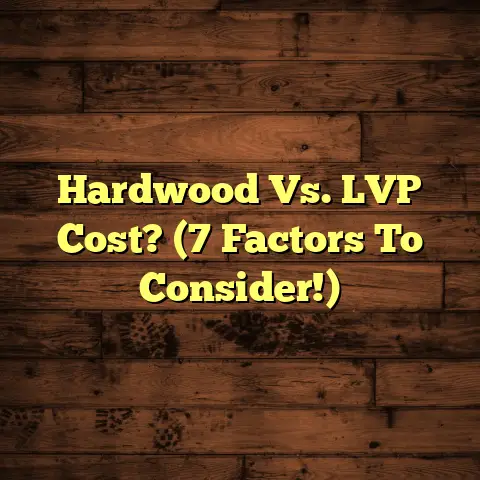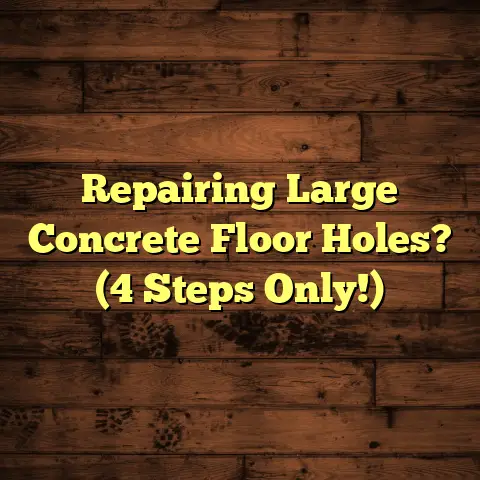Garage Epoxy Cost: What To Expect? (2024 Rates!)
What To Expect? (2024 Rates!)
I’m a flooring contractor, and I know a thing or two about turning drab spaces into fab spaces.
Let’s talk garages.
Think about your own garage. Is it a sanctuary for your woodworking projects? A haven for tinkering with cars? Maybe it’s your crafting corner or even a home gym.
Whatever your passion, a well-organized and functional garage is key.
But let’s be honest: most garages start as cluttered storage zones.
What if I told you that a simple flooring upgrade could transform that space into a vibrant workshop or hobby zone?
That’s where epoxy flooring comes in.
It’s durable, looks fantastic, and is easy to maintain.
In this article, I’ll break down everything you need to know about garage epoxy costs in 2024.
We’ll cover the different types of epoxy, factors influencing the price, real-life examples, and even potential hidden costs.
Let’s dive in!
Understanding Garage Epoxy Flooring
What is Epoxy Flooring?
Okay, let’s get technical for a sec.
Epoxy flooring isn’t just paint. It’s a thermosetting polymer coating made from a resin and a hardener.
When these two components mix, a chemical reaction occurs, creating a rigid, durable plastic material.
This mixture is applied to a properly prepared concrete floor and then cures over several days, resulting in a seamless, smooth, and resilient surface.
Think of it like this: you’re essentially encapsulating your garage floor in a protective shield.
Benefits of Epoxy Flooring in Garages
Why should you even consider epoxy?
Here’s a rundown of the benefits:
-
Durability: Epoxy can withstand heavy machinery, dropped tools, and the constant wear and tear that comes with garage use.
- Did you know? According to a study by the Concrete Polishing Association of America, epoxy flooring can last for decades with proper maintenance.
-
Chemical Resistance: Oil spills? No problem. Epoxy resists gasoline, brake fluid, antifreeze, and other common garage chemicals.
-
Ease of Cleaning: A simple mop and some soap are all you need to keep your epoxy floor looking brand new.
-
Aesthetic Versatility: Epoxy comes in various colors, patterns, and finishes.
You can customize it to match your personal style or even create a showroom-worthy garage.
-
Safety: Epoxy can be formulated with anti-slip additives, making your garage safer, especially when working with tools or handling heavy equipment.
Types of Epoxy Flooring Options
Different Types of Epoxy Coatings
Not all epoxy is created equal.
Here’s a look at some common types:
-
Solid Epoxy: This is the most basic type, consisting of 100% solids epoxy.
It’s durable and provides a thick, protective layer.
- Pros: Cost-effective, durable.
- Cons: Limited aesthetic options.
-
Epoxy Flake: Decorative flakes are broadcasted into the wet epoxy, creating a textured, slip-resistant surface.
- Pros: Visually appealing, hides imperfections.
- Cons: Can be more expensive than solid epoxy.
-
Metallic Epoxy: Metallic pigments are mixed into the epoxy, creating a swirling, three-dimensional effect.
- Pros: Unique, high-end appearance.
- Cons: Most expensive option, requires skilled installation.
-
Self-Leveling Epoxy: Creates a perfectly smooth surface, ideal for floors with minor imperfections.
- Pros: Smooth, seamless finish.
- Cons: Can be more expensive than solid epoxy.
Customization Options
One of the coolest things about epoxy is how customizable it is.
You can choose from a wide range of colors to match your favorite sports team, your car, or just your personal taste.
You can also add decorative flakes, metallic pigments, or even logos.
Want a floor that looks like granite or marble? Metallic epoxy can do that.
Looking for a more industrial vibe? A solid gray epoxy with a matte finish might be perfect.
The possibilities are endless!
Factors Influencing Garage Epoxy Costs
Material Costs
The type of epoxy you choose will significantly impact the overall cost.
Solid epoxy is generally the most affordable, while metallic epoxy is the most expensive.
Here’s a rough estimate of material costs per square foot:
| Type of Epoxy | Cost per Sq Ft |
|---|---|
| Solid Epoxy | \$3 – \$5 |
| Epoxy Flake | \$4 – \$7 |
| Metallic Epoxy | \$7 – \$12 |
| Self-Leveling Epoxy | \$5 – \$8 |
These are just estimates, and prices can vary depending on the brand, quality, and where you purchase the materials.
- Pro Tip: Buy in bulk to save money, especially if you have a large garage.
Labor Costs
While DIY epoxy kits are available, I always recommend professional installation.
Why? Because proper preparation is crucial.
A professional will ensure that your floor is clean, free of cracks, and properly prepared to receive the epoxy coating.
They’ll also have the expertise to mix and apply the epoxy correctly, ensuring a smooth, durable finish.
Labor costs can vary depending on your location and the complexity of the job.
On average, you can expect to pay between \$2 and \$5 per square foot for professional installation.
Preparation and Additional Materials
Before the epoxy can be applied, your garage floor needs to be prepped.
This typically involves:
- Cleaning: Removing oil stains, dirt, and debris.
- Grinding: Etching the concrete surface to create a better bond for the epoxy.
- Crack Repair: Filling any cracks or holes in the concrete.
These preparation steps can add to the overall cost.
You may also need to purchase additional materials like:
- Primers: To improve adhesion.
- Sealers: To protect the epoxy from scratches and stains.
Average Costs for Garage Epoxy
Installation in 2024
Cost Estimates
Okay, let’s get down to brass tacks.
Here’s a breakdown of average costs for installing epoxy flooring in garages in 2024:
| Garage Size | Type of Epoxy |
|---|---|
| 250 Sq Ft | Solid Epoxy |
| 250 Sq Ft | Epoxy Flake |
| 250 Sq Ft | Metallic Epoxy |
| 500 Sq Ft | Solid Epoxy |
| 500 Sq Ft | Epoxy Flake |
| 500 Sq Ft | Metallic Epoxy |
| Garage Size | Type of Epoxy |
|---|---|
| 250 Sq Ft | Solid Epoxy |
| 250 Sq Ft | Epoxy Flake |
| 250 Sq Ft | Metallic Epoxy |
| 500 Sq Ft | Solid Epoxy |
| 500 Sq Ft | Epoxy Flake |
| 500 Sq Ft | Metallic Epoxy |
| Garage Size | Type of Epoxy |
|---|---|
| 250 Sq Ft | Solid Epoxy |
| 250 Sq Ft | Epoxy Flake |
| 250 Sq Ft | Metallic Epoxy |
| 500 Sq Ft | Solid Epoxy |
| 500 Sq Ft | Epoxy Flake |
| 500 Sq Ft | Metallic Epoxy |
| Garage Size | Type of Epoxy | Estimated Cost |
|---|---|---|
| 250 Sq Ft | Solid Epoxy | \$1,250 – \$2,500 |
| 250 Sq Ft | Epoxy Flake | \$1,750 – \$3,000 |
| 250 Sq Ft | Metallic Epoxy | \$2,500 – \$4,250 |
| 500 Sq Ft | Solid Epoxy | \$2,500 – \$5,000 |
| 500 Sq Ft | Epoxy Flake | \$3,500 – \$6,000 |
| 500 Sq Ft | Metallic Epoxy | \$5,000 – \$8,500 |
These estimates include both materials and labor.
Keep in mind that these are just averages, and your actual cost may vary.
Regional Variations
Location, location, location!
The cost of epoxy flooring can vary significantly depending on where you live.
Labor rates are higher in some areas than others, and the availability of materials can also affect pricing.
For example, you might pay more for epoxy flooring in a major metropolitan area than in a rural area.
- Tip: Get quotes from multiple contractors in your area to ensure you’re getting a fair price.
Case Studies and Real-Life Examples
Homeowner Testimonials
I’ve worked with tons of homeowners who have transformed their garages with epoxy flooring.
Here are a few of their stories:
-
John from California: “I’m a car enthusiast, and my garage is my sanctuary. I installed metallic epoxy flooring, and it looks amazing! It cost me around \$4,000, but it was worth every penny.”
-
Sarah from Texas: “I use my garage for crafting, and the concrete floor was always cold and dusty. I went with epoxy flake flooring, and it’s made a huge difference. It’s so much easier to clean, and it looks great. The total cost was around \$2,500.”
-
Mike from New York: “I have a small garage, and I wanted something durable and easy to maintain. I chose solid epoxy flooring, and it’s perfect. It only cost me around \$1,500, and it looks fantastic.”
Before and After Comparisons
Seeing is believing, right?
Here are a few examples of garages before and after epoxy installation:
-
Garage #1: A cluttered, oil-stained concrete floor transformed into a showroom-worthy space with metallic epoxy flooring. Cost: \$4,500.
-
Garage #2: A dusty, cracked concrete floor turned into a clean, functional workshop with epoxy flake flooring. Cost: \$2,800.
-
Garage #3: A plain concrete floor upgraded to a durable, easy-to-clean surface with solid epoxy flooring. Cost: \$1,600.
Potential Hidden Costs
Maintenance Costs
Epoxy flooring is relatively low-maintenance, but there are still some ongoing costs to consider.
You’ll need to clean your floor regularly with a mild detergent and water.
You may also need to reapply a sealer every few years to protect the epoxy from scratches and stains.
- Tip: Avoid using harsh chemicals or abrasive cleaners, as they can damage the epoxy.
Repair Costs
While epoxy is durable, it’s not indestructible.
If you drop a heavy object on your floor, you could chip or crack the epoxy.
Repairs can range from a simple patch to a complete resurfacing, depending on the extent of the damage.
- Tip: Consider keeping some extra epoxy on hand for minor repairs.
Final Thoughts on Garage Epoxy Costs
Weighing Costs Against Benefits
Okay, so epoxy flooring can be a significant investment.
But consider the long-term benefits:
- Increased Durability: Epoxy will protect your garage floor from damage and wear and tear.
- Improved Aesthetics: Epoxy can transform your garage into a showroom-worthy space.
- Enhanced Functionality: Epoxy makes your garage easier to clean and maintain.
- Increased Home Value: A well-finished garage can add value to your home.
Conclusion
Your garage is more than just a place to park your car.
It’s a workshop, a hobby zone, and a storage space.
Investing in epoxy flooring can transform your garage into a functional and aesthetically pleasing space that you’ll enjoy for years to come.
So, take a good look at your garage floor and consider the possibilities.
With the right epoxy flooring, you can create a space that’s perfect for your hobbies and your lifestyle.





